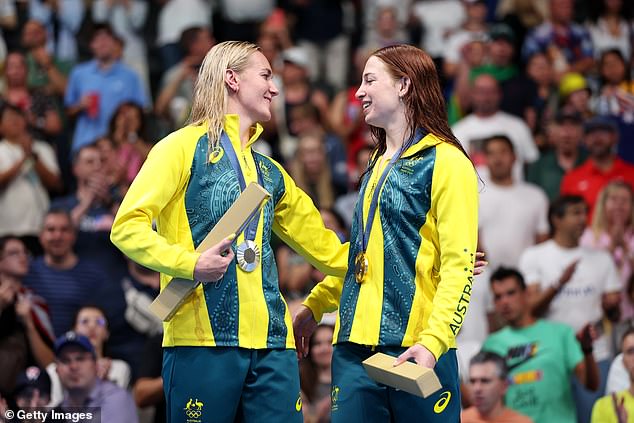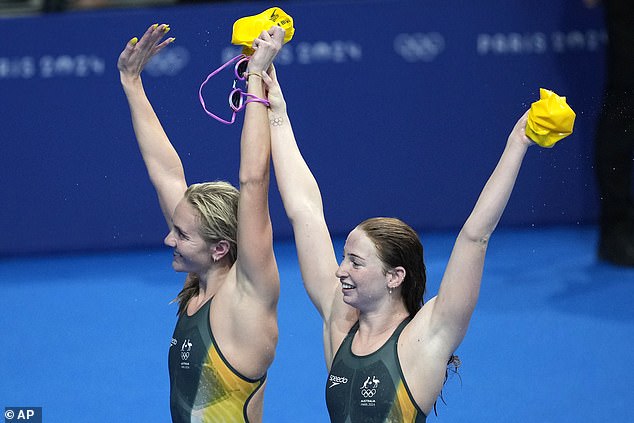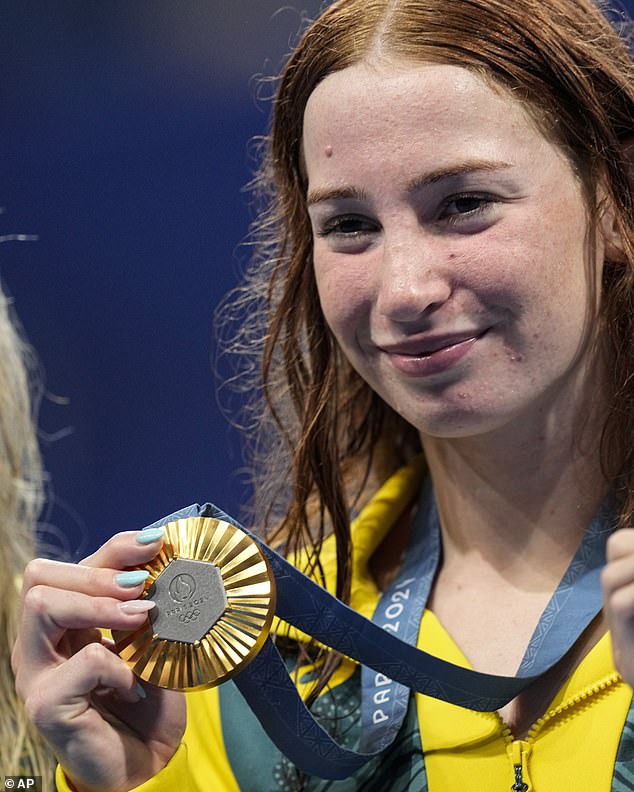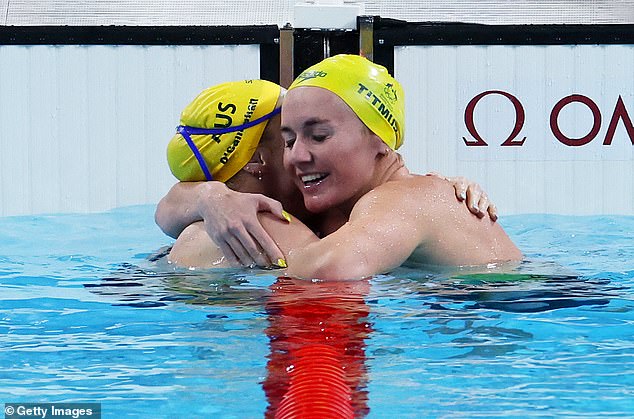Mollie O’Callaghan makes a heartwarming gesture to Ariarne Titmus after beating her to Olympic gold – and reveals who inspired her to the incredible victory
- 20-year-old wins women’s 200m freestyle
- She and Titmus are both coached by Dean Boxall
- Their close relationship was on display in Paris
Mollie O’Callaghan showed she’s as classy out of the water as she is in it by giving a sweet gesture to her mate Ariarne Titmus after beating her in the women’s 200m freestyle in Paris.
The 20-year-old thwarted Titmus’ bid to become the only swimmer in Olympic history to successfully defend her Olympic titles in both the 200m and 400m freestyle, and said she would not be racing for herself on Tuesday morning.
Both swimmers embraced while still in the pool after the thrilling race, which saw O’Callaghan take an early lead and then fight hard on the final lap to break the Olympic record.
As they took their places on the podium to receive their medals, O’Callaghan invited Titmus to join her on the podium. The two embraced as they stood together in the spotlight while the national anthem was played.
“It’s such an honour to have … Arnie, she’s a real trooper,” O’Callaghan said after the game.
‘She races like an absolute beast and it’s an honour to train alongside her and have such a great team around us.
“That was a great race… I did it for the country, not for myself.”
When asked how she bounced back after being beaten by Titmus at the Australian trials last month, where the Tasmanian broke the world record, O’Callaghan said she used the loss as fuel.
O’Callaghan invited her friend and training partner Titmus to the top of the podium in a classy gesture after winning gold in the 200m freestyle

Titmus was overjoyed for her compatriot, who said after the race that she used the pressure of beating the world record holder as fuel to overcome her nerves

The world’s two fastest women are pictured greeting the crowd after the race
‘You have to accept the challenge… You can run from it or fight. I choose to fight.
‘I always strive for more and I always put a lot of pressure on myself. My expectations are very high.
“I always want that little bit more. To be honest, I did it for the country, I didn’t do it for myself. I race for all these people.”
The 20-year-old O’Callaghan clocked one minute and 53.27 seconds in the final at the Paris La Defense Arena on Monday evening, while Titmus (1:53.81) won silver.
For O’Callaghan, this is her first individual Olympic gold medal. She has won three relay gold medals, including two at the Tokyo Games three years ago and the 4x100m freestyle in Paris on Saturday night.
O’Callaghan was third with 50 metres to go, but he eventually won with a final lap that he made some 0.66 seconds faster than Titmus, who took the final corner in second place.
Her triumph gave Australia its fifth gold medal at the Paris Games, three of which came in the swimming pool.

With the win, O’Callaghan took revenge for her loss to Titmus in last month’s Australian trials.

The 20-year-old described the race against her arch-rival as ‘an honour’ – and there was no trace of disappointment on Titmus’ face as they embraced in the water just after the finish
Meanwhile, Australia’s reigning women’s 100m backstroke champion Kaylee McKeown was the second-fastest competitor in the semi-finals.
McKeown, who was looking to repeat her gold in the 100-200m backstroke at the Tokyo Games three years ago, clocked 57.99 seconds, just two hundredths of a second behind her closest rival, American Regan Smith.
The Dolphins’ 18-year-old Olympic debutant Iona Anderson (58.63, fourth place) will also compete in Tuesday night’s medal race.
Her compatriot Ella Ramsey finished fifth in the women’s 400m individual medley final, won by Canada’s Summer McIntosh.
And fellow countryman Max Giuliani finished seventh in the men’s 200m freestyle final, won by Romania’s David Popovici.
In Monday night’s other finals, which did not include Australians, Italy’s Thomas Ceccon won the men’s 100m backstroke and South Africa’s Tatjana Smith took gold in the women’s 100m breaststroke.
